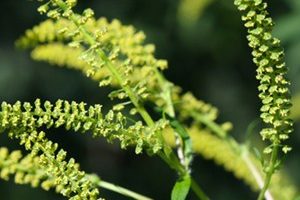
According to a study presented at the American Chemical Society's annual meeting, if you seem to be having worse seasonal allergies than usual this year, it's not just all in your head. The culprit is the same as the one that brought us the warmest winter on record this year: global climate change and the pollution that comes along with it. The study found that two pollutants associated with global warming, ozone and nitrogen dioxide, actually change the chemical composition of pollen, making it more allergenic.
Scientists from the Max Planck Institute for Chemistry in Germany used computer simulations and laboratory tests to see what would happen when they combined ozone and nitrogen dioxide with a particular type of allergen found in birch pollen. As it turns out, all three of the substances work together to create a potent allergenic cocktail. Ozone was found to cause structural changes in the proteins of the allergen, allowing it to bond with nitrogen dioxide in the air. Nitrogen dioxide is known to increase immune response, worsening allergic reactions. The altered allergens can also bond with each other, creating larger, hyper-potent molecules.
Study co-author Ulrich Pöschl hopes that the results will motivate people to think about how human activity may be affecting our health worldwide.
"Humans are not just affecting but shaping the environment … it's actually unreasonable to assume that it would not affect humans with our highly delicate immune system. That's the background motivation for these kinds of studies," Pöschl said at the conference.
If you have seasonal allergies, now is the time to invest in a home air purifier to help yourself manage your symptoms. Contact us for help finding an air purifier for allergies.